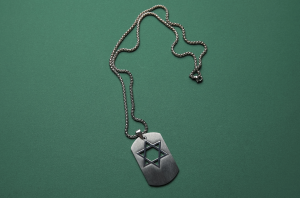Firstly, we need to understand why Kaddish is recited by mourners. If you look carefully you will see that not a word about mourning is mentioned in the Kaddish. Furthermore, Kaddish is the most commonly recited prayer throughout the traditional prayer service, being said by the leader or chazan between and at the end of every section of the service with no connection whatsoever to mourning!
The answer is, Kaddish per se has nothing to do with mourning. It’s just that certain Kaddishes which need to be recited during the prayer service are given to mourners to have “first dibs,” or the first right of recital. But if the Kaddish is not about mourning, why give it to the mourners?!
The essence of the life of a Jew is to perform a “Kiddush Hashem,” to live a life of the sanctification of G-d’s Name. According to the Torah, every act a Jew performs in his or her life should be one which effects a Kiddush Hashem.
This is implicit in the verse, “God spoke to Moses, saying: Speak to the entire assembly of the Children of Israel and say to them: You shall be holy, or holy am I, Hashem your God.” This concept is repeated numerous times throughout the Torah, as is the foundation of the life of both the individual Jew and the Jewish people as a whole. It means to live every moment as a Jew and, at times – at the ultimate moment of truth, the willingness to even give up one’s own life for Kiddush Hashem as countless scores of Jews have done throughout the ages.
With that background (which we only slightly just touched upon; volumes could be written to expound upon it), whenever a Jewish life is lost, his or her loss creates a vacuum in the sum total of Kiddush Hashem being effected in the world. That person’s family are the ones first charged with the obligation to do something beyond what they have done thus far in their lives to create more of a Kiddush Hashem, to make up for the loss of the honor to the Name of G-d, which is now missing.
Any Torah they study or mitzvos they, or others outside the family, perform in the memory of the deceased helps make up for the lost Kiddush Hashem and, thereby, brings benefit and joy to the soul of the deceased.
One of the most direct ways to do so is to recite the Kaddish. The word “Kaddish” comes from the same word “Kiddush” in Kiddush Hashem, a sanctification of G-d’s name. The entire Kaddish prayer is based on the beginning which proclaims, “Yisgadal veyiskadash Sh’me Rabboh!” (“may Your Great Name be glorified and elevated!”). The entire Kaddish is an act of Kiddush Hashem!
We give the mourners certain Kaddishes to recite in order to enable them to create a tremendous Kiddush Hashem to somewhat fill the vacuum caused by the loss of their family member. That brings tremendous nachas to the soul of the deceased, that they, through those left behind, continue to be responsible for generating a Kiddush Hashem in G-d’s world!
Kaddish is a response to the mitzvah of Kedoshim Tihiyu, be a holy nation!
Of course G-d, and the Jews, are sad about any human being who is killed. But once we understand the meaning of Kaddish, it goes without saying that it is inappropriate to recite Kaddish over the loss of Hamas operatives. Kaddish is not simply a response to “loss of life,” rather to the void in the world in the arena of Kiddush Hashem, something which is as far as could be from the death of a Hamas operative.
Allow me to add a strong personal feeling as a postscript, which will undoubtedly not win me any popularity contests, but needs to be said. Those British Jews responded to their critics that if it were Jews who were killed, they would have said Kaddish for them as well. And I ask, did those same Jews publicly recite Kaddish when terrorists murdered the Fogel family in the West Bank, or when the four Rabbis were murdered in cold blood during a morning service in Har Nof wearing their tallis and tefillin, or when numerous terrorist attacks took the lives of dozens or hundreds of Jews? Have they assembled to recite kaddish over the deaths of a half-million Syrians killed by the war in that country? When villages in Africa were burnt to the ground killing all their residents by the Boca Harem? I think we all know the answer to these questions. It’s not the death of Gazans they care about, but that Israelis killed them. They would NOT have recited Kaddish if Israelis would have been killed because, and I hate to say it, but I think that would have made them feel good, as deep down these are self-hating Jews who can’t bear the fact the Jews are actually showing strength and defending themselves against terrorism. Over the generations, some of the most virulent anti-Semites were self-hating Jews. They are infiltrating our campuses and institutions and turning public opinion against their own people. It’s not for Gazans they are reciting Kaddish, but for their own Judaism. This may be difficult to hear, but I challenge anyone to prove me wrong!
Sincerely,
Rabbi Yerachmiel Fried


